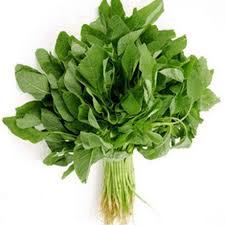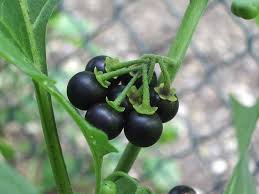Typical yield
12.5 t/ha
Varieties
3
Pest/Disease
9
Seasons
5
Profile
- Growth habit
- annual
- Lifecycle (days)
- 60–120
- Primary uses
- Leafy vegetable; medicinal; cooked greens
- Pollination
- self
- Origin / distribution
- Sub-Saharan Africa; cultivated across East Africa
Environment
Climate
Temp optimal
18–28 °C
Rain optimal
600–1200 mm/yr
Altitude
0–2400 m
Soil
pH optimal
5.5–6.8
Soil type
Well-drained loam with high organic matter
Farmer Guide
Row spacing
30 cm
Plant spacing
20 cm
Depth
0.5 cm
Seed rate
2 kg/ha
Nursery days
25
Planting: Raise seedlings in a nursery; transplant at 4–6 true leaves. Incorporate compost before transplant; mulch lightly and keep beds weed-free.
Transplanting: Harden 3–5 days; transplant late afternoon; water in well.
Irrigation: Maintain ~25–35 mm/week; increase during hot spells; avoid waterlogging.
Fertigation: Under drip, supply small weekly N doses during active harvest.
Pest scouting: Scout weekly; check underside of leaves for aphids/mites and leaf miner tracks.
Pruning/Training: Pinch tips to encourage side shoots and more leaf area.
Harvest: First picking 3–5 weeks post-transplant; harvest young shoots/leaves every 7–14 days.
Postharvest: Shade-cool or hydrocool promptly; bundle and store at 10–12 °C with high RH.
Nutrient Schedule
| # | Stage | DAP | Product | Rate | Targets (kg/ha) | Notes |
|---|---|---|---|---|---|---|
| 1 | Basal at transplant | 0 | Compost + NPK 17-17-17 | 5 t/ha + kg/ha | N: 17, P₂O₅: 17, K₂O: 17 | Incorporate compost; band NPK lightly 5 cm from seedlings |
| 2 | Topdress 1 | 14 | CAN 26% N | 60 kg/ha | N: 18, P₂O₅: —, K₂O: — | Irrigate after application |
| 3 | Topdress 2 | 28 | CAN 26% N + MOP | 60 kg/ha + kg/ha | N: —, P₂O₅: —, K₂O: — | Support regrowth prior to first heavy pickings |
| 4 | Maintenance (harvest phase) | 42 | Urea via fertigation (optional) | 10 kg N/ha/week | N: —, P₂O₅: —, K₂O: — | Weekly for 3–4 weeks depending on vigor |
| 5 | Micronutrient foliar | 21 | Trace mix (Fe, Zn, B) | 0 — | N: —, P₂O₅: —, K₂O: — | Apply early morning/late afternoon |
Nutrient Requirements
| Nutrient | Stage | Amount | Unit |
|---|---|---|---|
| N | Basal | 30 | kg/ha |
| P₂O₅ | Basal | 30 | kg/ha |
| K₂O | Basal | 30 | kg/ha |
| N | Topdress | 70 | kg/ha |
Images


| Name | Country | Maturity | Traits |
|---|---|---|---|
| Broadleaf type | KE | 45–60 | Vigorous; higher leaf yield |
| Narrowleaf type | UG | 50–65 | Tolerates heat; mild flavor |
| Local landrace | TZ | 55–70 | Good regrowth after harvest |
| Stage | Product | Rate (kg/ha) | Notes |
|---|---|---|---|
| Basal | Compost (well-decomposed) | 5000 | Incorporate before transplant |
| Basal | NPK 17-17-17 | 150 | Band lightly beside seedlings |
| Topdress | CAN 26% N | 120 | Split into two 60 kg/ha doses |
| Topdress | MOP (KCl) | 30 | If tissue tests show low K |
| Foliar | Micronutrient mix | 0 | Apply as per label |
| Name | Type | Symptoms | Management |
|---|---|---|---|
| Aphids | pest | Curling shoots; sticky honeydew | Scout weekly; remove infested tips; soft soaps/labelled selective insecticides; conserve natural enemies |
| Spider mites | pest | Maintain humidity; miticides if severe | |
| Leaf spots | disease | Sanitation; avoid overhead irrigation; fungicides if needed | |
| Leaf miners | pest | Serpentine mines in leaves | Remove mined leaves; use traps; rotate actives if spraying |
| Red spider mites | pest | Stippling; webbing under hot/dry conditions | Maintain humidity; spot-spray oils/acaricides if needed |
| Flea beetles | pest | Shot holes on young leaves | Mulch; row covers; spot treatments if severe |
| Bacterial wilt | disease | Sudden wilting; bacterial ooze | Rotate 2–3 years out of solanaceae; rogue infected plants; sanitize tools |
| Early blight | disease | Target-like leaf spots | Improve airflow; avoid overhead irrigation; fungicide if needed |
| Powdery mildew | disease | White powdery growth | Scout; sulfur/labelled fungicides; remove heavily infected leaves |
| System | Typical | Min | Max | Notes |
|---|---|---|---|---|
| rainfed smallholder | 10 | 5 | 15 | Cumulative across repeated pickings (fresh leaves) |
| irrigated | 10 | 6 | 15 | |
| open-field | 12 | 8 | 18 | Leafy biomass (fresh) |
| irrigated / intensive | 18 | 10 | 25 | Good fertility and frequent harvests |
| Country | Region | Planting | Harvest |
|---|---|---|---|
| KE | Highlands (long rains) | Mar–Apr | May–Jul |
| KE | Highlands (short rains) | Oct–Nov | Dec–Feb |
| UG | Central/Western (1st) | Mar–Apr | May–Jul |
| UG | Central/Western (2nd) | Aug–Sep | Oct–Dec |
| TZ | Northern unimodal | Nov–Dec | Jan–Mar |
| Country | Region | Suitability |
|---|---|---|
| ET | Mid-altitude areas | Medium |
| KE | Arid/semi-arid | Low |
| KE | Coastal humid | Medium |
| KE | Highlands & mid-altitudes | High |
| KE | Western | |
| RW | Highland zones | High |
| TZ | Northern highlands | High |
| UG | Central & Western | High |
